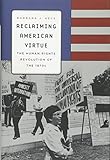Reclaiming American Virtue : The Human Rights Revolution of the 1970s / Barbara J. Keys.
Material type: TextPublisher: Cambridge, MA : Harvard University Press, [2014]Copyright date: ©2014Edition: Pilot project. eBook available to selected US libraries onlyDescription: 1 online resource (368 p.)Content type:
TextPublisher: Cambridge, MA : Harvard University Press, [2014]Copyright date: ©2014Edition: Pilot project. eBook available to selected US libraries onlyDescription: 1 online resource (368 p.)Content type: - 9780674724853
- 9780674726031
- 323.0973/09047 23
- JC599.U5 K49 2014eb
- online - DeGruyter
| Item type | Current library | Call number | URL | Status | Notes | Barcode | |
|---|---|---|---|---|---|---|---|
 eBook
eBook
|
Biblioteca "Angelicum" Pont. Univ. S.Tommaso d'Aquino Nuvola online | online - DeGruyter (Browse shelf(Opens below)) | Online access | Not for loan (Accesso limitato) | Accesso per gli utenti autorizzati / Access for authorized users | (dgr)9780674726031 |
Browsing Biblioteca "Angelicum" Pont. Univ. S.Tommaso d'Aquino shelves, Shelving location: Nuvola online Close shelf browser (Hides shelf browser)

|

|

|

|

|

|

|
||
| online - DeGruyter The United States and South America : The Northern Republics / | online - DeGruyter Anselm's Other Argument / | online - DeGruyter On the Organic Law of Change : A Facsimile Edition and Annotated Transcription of Alfred Russel Wallace's Species Notebook of 1855-1859 / | online - DeGruyter Reclaiming American Virtue : The Human Rights Revolution of the 1970s / | online - DeGruyter Civil Examinations and Meritocracy in Late Imperial China / | online - DeGruyter The American Political Landscape / | online - DeGruyter The Metaphysics and Ethics of Relativism / |
Frontmatter -- Contents -- Introduction: Enter Human Rights -- 1. The Postwar Marginality of Universal Human Rights -- 2. Managing Civil Rights at Home -- 3. The Trauma of the Vietnam War -- 4. The Liberal Critique of Right-Wing Dictatorships -- 5. The Anticommunist Embrace of Human Rights -- 6. A New Calculus Emerges -- 7. Insurgency on Capitol Hill -- 8. The Human Rights Lobby -- 9. A Moralist Campaigns for President -- 10. “We Want to Be Proud Again” -- Conclusion: Universal Human Rights in American Foreign Policy -- Abbreviations -- Notes -- Bibliographical Essay -- Acknowledgments -- Index
restricted access online access with authorization star
http://purl.org/coar/access_right/c_16ec
The American commitment to promoting human rights abroad emerged in the 1970s as a surprising response to national trauma. In this provocative history, Barbara Keys situates this novel enthusiasm as a reaction to the profound challenge of the Vietnam War and its aftermath. Instead of looking inward for renewal, Americans on the right and the left looked outward for ways to restore America's moral leadership. Conservatives took up the language of Soviet dissidents to resuscitate the Cold War, while liberals sought to dissociate from brutally repressive allies like Chile and South Korea. When Jimmy Carter in 1977 made human rights a central tenet of American foreign policy, his administration struggled to reconcile these conflicting visions. Yet liberals and conservatives both saw human rights as a way of moving from guilt to pride. Less a critique of American power than a rehabilitation of it, human rights functioned for Americans as a sleight of hand that occluded from view much of America's recent past and confined the lessons of Vietnam to narrow parameters. From world's judge to world's policeman was a small step, and American intervention in the name of human rights would be a cause both liberals and conservatives could embrace.
Mode of access: Internet via World Wide Web.
In English.
Description based on online resource; title from PDF title page (publisher's Web site, viewed 08. Aug 2023)


